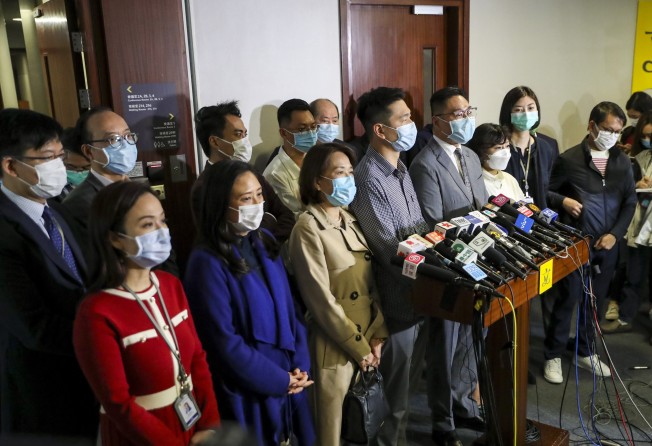Behind the bluster, Beijing is really cracking the whip on pro-establishment lawmakers
- Hong Kong’s legislative gridlock has drawn statements from Beijing’s representatives. But democrats’ filibusters are old news. Beijing is likely more disappointed that the pro-establishment camp hasn’t broken the gridlock after months of delay

Back in 2017, when the pro-establishment camp was planning to tighten rules and limit filibustering tactics in the Legislative Council, opposition lawmaker Dennis Kwok Wing-hang was asked whether it was fair for his camp to stall the other side by proposing 34 amendments to Legco’s rules of procedure. His answer? “All’s fair in love and war.”
Filibusters are pretty much the opposition’s sole modus operandi. For years, pro-democracy lawmakers like Kwok of the Civic Party have been delaying government legislation they don’t like by filibustering.
For half a year now, Kwok, presiding over the House Committee as deputy chairman and collaborating with other pan-democrats, has held off electing a chair and prevented bills from reaching a floor vote. And they make no secret of why they are doing this: they mean to stall a final vote on the national anthem bill.
This deadlock has caused the unprecedented release of statements by both the Hong Kong and Macau Affairs Office (HKMAO) and the Liaison Office of the Central People’s Government that directly addressed the way Hong Kong lawmakers conduct their business, bringing gasps of astonishment at home and abroad. Since 1997, HKMAO and the liaison office had, for the most part, taken a hands-off approach and exercised restraint, at least when it came to making public statements.
When they became increasingly assertive following the Occupy movement, it was clearly Beijing’s way of pushing back. In 2015, Zhang Xiaoming, then director of the liaison office, caused quite the stir when he said that the chief executive of Hong Kong has a special legal status that transcends all three branches of government.
What is written on the wall is Beijing’s growing impatience not with the pro-democracy camp, but with the pro-establishment camp. The pan-democrats’ tactics lost their shock appeal years ago. Instead, the pro-establishment camp’s performance is the reason why Beijing has been making its presence felt and visibly exercising its authority in Hong Kong.
The pro-establishment camp has not really been able to counter any of the pan-democrats’ moves since the Occupy movement, which drew comments from those who had traditionally tried to keep their distance from Hong Kong politics. Chen Zuoer, a former deputy director of HKMAO, attributed Hong Kong’s internal strife to two factors: a failure to decolonise the city, and the revival of “de-sinofication”.
That was a slap in the face of the pro-establishment camp – an implied rebuke about its failure to win the hearts and minds of Hongkongers.
The stark fact is that pro-establishment lawmakers sat through six months of these House Committee meetings but couldn’t find a way out. Sure, they whined, but then they sat on their hands and produced no solution to the problem. Andrew Leung Kwan-yuen, who had chaired the House Committee before he became president of Legco, didn’t seek external legal advice on what could be done until late March.
Others, like former House Committee chair Miriam Lau Kin-yee and former Legco secretary general Pauline Ng Man-wah, had both asked why the incumbent chairwoman Starry Lee Wai-king had not exercised the power vested in her to convene meetings.
It was shocking to read about a pro-establishment heavyweight telling this newspaper their camp “would be doomed” to repeat their defeat in last November’s district council elections if they only relied on the current administration to canvass support. The statement suggested pro-establishment lawmakers had lost the plot.
Canvassing votes and support is their primary business – not something to be outsourced. If they think the Hong Kong Coalition formed by former chief executives Tung Chee-hwa and Leung Chun-ying is a springboard to win them the Legco election this coming September, they have completely gone off the deep end.
The latest moves by the HKMAO and the liaison office have many worried about Kwok’s political future, but he is hardly the only one who needs to be worried. Beijing’s message to the pro-establishment camp is “shape up or ship out”. As Kwok said, “All’s fair in love and war.” Certainly, the pro-establishment camp is in need of some tough love.
Alice Wu is a political consultant and a former associate director of the Asia Pacific Media Network at UCLA
Help us understand what you are interested in so that we can improve SCMP and provide a better experience for you. We would like to invite you to take this five-minute survey on how you engage with SCMP and the news.